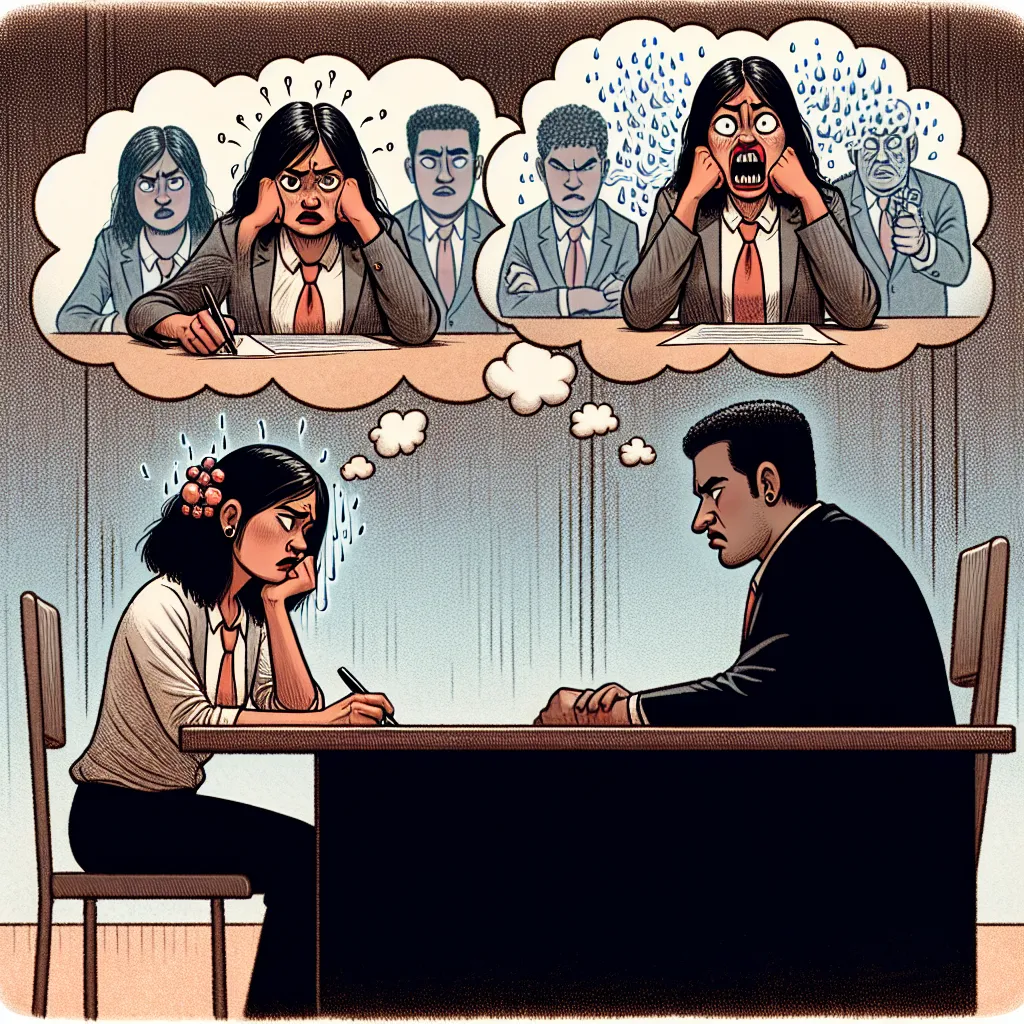Have you ever walked out of an interview feeling like you’ve just experienced a disaster? Don’t worry; you’re not alone. Bad interviews happen to even the most qualified candidates. The key is not to let a single poor performance define your job search journey. In this article, we’ll explore effective strategies on How To Handle A Bad Interview, learn from the experience, and move forward with confidence.
Understanding What Constitutes a Bad Interview
Before we dive into solutions, it’s important to recognize what qualifies as a bad interview. Common scenarios include:
- Feeling unprepared for the questions asked
- Experiencing extreme nervousness that affected your responses
- Arriving late due to unforeseen circumstances
- Realizing midway that the job isn’t a good fit
- Struggling to establish rapport with the interviewer
Remember, what feels like a catastrophe to you might not be as bad as you think from the interviewer’s perspective.
 Bad interview scenarios
Bad interview scenarios
Immediate Actions After a Bad Interview
1. Take a Deep Breath and Reflect
The first step is to calm yourself. Take a few deep breaths and try to objectively assess what happened. It’s easy to catastrophize, but a clear mind will help you analyze the situation more accurately.
2. Identify Specific Issues
Make a list of what you think went wrong. Was it a particular question you struggled with? Did you forget to mention key achievements? Identifying specific issues will help you address them in the future.
3. Send a Thank-You Note with a Twist
Even after a bad interview, sending a thank-you note is crucial. Use this opportunity to:
- Express gratitude for the interviewer’s time
- Briefly address any major mishaps (e.g., “I realize I may have misunderstood your question about…”)
- Provide additional information or clarify points you feel you didn’t articulate well during the interview
Here’s an example:
“Dear [Interviewer’s Name],
Thank you for taking the time to meet with me today. I appreciate the opportunity to discuss the [Position Name] role at [Company Name].
Upon reflection, I realize I may not have fully articulated my experience with project management. I’d like to clarify that I’ve successfully led three major projects, each with teams of 10+ members, resulting in on-time and under-budget deliveries.
I remain very enthusiastic about the possibility of joining your team and contributing to [specific company goal or project].
Thank you again for your consideration.
Best regards,
[Your Name]”
Learning from the Experience
1. Conduct a Post-Interview Analysis
Take time to thoroughly analyze what went wrong and why. This self-reflection is crucial for improvement.
2. Seek Feedback
If possible, reach out to the interviewer or the hiring manager for feedback. While not all will respond, those who do can provide valuable insights.
3. Practice, Practice, Practice
Use this experience to fuel your interview preparation. Practice answering difficult questions, work on your body language, and consider mock interviews with friends or professionals.
Moving Forward After a Bad Interview
1. Don’t Dwell on It
While it’s important to learn from the experience, don’t let it consume you. Every interview, good or bad, is a learning opportunity.
2. Refocus on Your Job Search
Continue applying for other positions. A bad interview doesn’t define your worth or capabilities.
3. Boost Your Confidence
Engage in activities that boost your confidence. This could be reviewing your achievements, updating your skills, or even taking a short course to enhance your qualifications.
 Confidence boost activities
Confidence boost activities
Common Follow-Up Questions and How to Handle Them
-
Q: How do you typically handle stressful situations?
A: “I find that breaking down complex problems into smaller, manageable tasks helps me stay focused and calm under pressure. For example, in my previous role, when faced with a tight deadline for a major project, I created a detailed timeline and delegated tasks effectively, ensuring we completed the project on time.” -
Q: Can you elaborate on a specific challenge you’ve faced in your career and how you overcame it?
A: “Certainly. In my last position, we faced a sudden change in client requirements mid-project. I immediately organized a team meeting to reassess our approach, reallocated resources, and communicated transparently with the client about the adjusted timeline. This proactive approach not only solved the immediate problem but also strengthened our relationship with the client.” -
Q: How do you stay motivated when facing setbacks?
A: “I believe in the power of perspective. When facing setbacks, I try to view them as opportunities for growth. I also maintain a ‘lessons learned’ journal, which helps me track my progress and reminds me of past challenges I’ve overcome. This practice keeps me motivated and focused on continuous improvement.” -
Q: If you could redo this interview, what would you do differently?
A: “Thank you for asking. Upon reflection, I realize I could have provided more concrete examples of my problem-solving skills. If given another opportunity, I would share specific instances where I’ve implemented innovative solutions, such as the time I developed a new inventory system that reduced costs by 15%.” -
Q: How do you ensure you’re well-prepared for important meetings or presentations?
A: “I believe in thorough preparation. This includes researching the topic extensively, anticipating potential questions, and practicing my delivery. I also find it helpful to prepare backup materials and to arrive early to familiarize myself with the environment. This approach has consistently helped me perform confidently in high-stakes situations.”
Common Mistakes to Avoid in Future Interviews
- Lack of Preparation: Always research the company and role thoroughly before the interview.
- Arriving Late: Plan your journey in advance and aim to arrive at least 15 minutes early.
- Negative Body Language: Maintain good eye contact, sit up straight, and smile genuinely.
- Speaking Negatively About Past Employers: Focus on what you learned from past experiences instead of criticizing former employers.
- Not Asking Questions: Prepare thoughtful questions about the role and company to show your interest and engagement.
Conclusion
Remember, a bad interview is not the end of your job search journey. It’s an opportunity to learn, grow, and improve. By following these strategies, you can turn a negative experience into a stepping stone for future success. Stay positive, keep refining your skills, and approach each new interview with renewed confidence.
For more tips on acing your interviews, check out our article on common interview mistakes to avoid. And if you’re looking to improve your ability to discuss challenging situations, our guide on how to discuss a difficult situation in an interview can be incredibly helpful.
Remember, every interview is a chance to showcase your best self. With the right preparation and mindset, you can turn even a bad interview experience into an opportunity for growth and success in your career journey.




